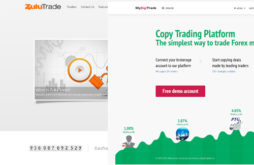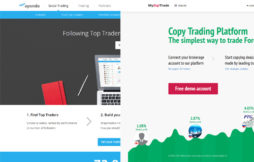What is social trading and how does it work
Social trading is one of the fastest growing trends on Forex, stock and other markets. But despite a growing number of social trading networks there are still a lot of traders wandering “What is social trading? And why is it so popular?”. People who have never tried social trading before may be nervous at first and not sure whether this activity is worth their time. But once they learn what social trading is and which benefits it offers many opt for joining social trading or copy trading network.
Nature of social trading
Social trading network works very similar to a regular social network, with the difference that on a trading network instead people share trading results with others instead of selfies and lunch photos. An opportunity to copy trades of other users is an important feature of social trading platforms. When you find a successful trader with suitable investment style you can choose to follow his strategy and all open trades will be automatically copied into your account. Unlike hiring money manager in social trading you don’t have to give access to your account or disclose any personal information to the person you copy. And if you are successful as trader you may get additional income by becoming a signal provider and selling your strategy to others (How to become a successful forex signal provider). A lot of people prefer social trading for it’s open concept, it is easy for a user to join and start making money by copying profitable strategies, and it is also easy for a signal provider to join and find signal receivers. Another benefit of social trading is an opportunity to interact with other traders, watch trading results of other people and discuss situation on the market in real-time.
How does social trading work
Signal providers on most social trading networks receive compensation for providing their services to others. The compensation can be a fixed monthly fee, a spread from volume of assets under management or a small percentage of their followers profit. Social trading networks, such as MyDigiTrade, are often free for copiers and by following someone a trader doesn’t pay anything but his regular broker commission.
Because all signal providers in a social trading network are obliged to disclose all of their trades you can be confident that you’re selecting actually profitable strategy and be aware of real financial results – another benefit of social trading compared to money manager. The exact stats available for a follower to analyse before copying someone depend on a platform. At MyDigiTrade we disclose full list of trades, including currently opened ones, along with profits, maximum drawdowns and other details, to make sure our users have the most complete and actual results. For a novice trader, just starting to learn what social trading is, these details can also be a great learning source and will help him become more successful at independent trading over time. Some social trading networks prefer to hide open trades from statistics or not to disclose the list of trades at all, but this may affect accuracy of profit/risk ratio and drawdowns.
Advantages of social trading
Social trading offers significant advantages to all users, such as
- Additional income for successful traders from selling their trading signals
- Passive income for copiers from following successful traders
- Opportunity to follow other peoples trading results in real-time
- Open concept, where data on signal provider trades is disclosed automatically and losses can not be deliberately hidden
- Space for communication with other traders and listening to their forecasts and opinion
Disadvantages of social trading
Open nature of social trading has it’s own disadvantages. At most social trading platforms signal providers are not pre-screened for risks and experience, so a follower needs to be very careful when deciding which strategy to follow. Some followers also complain about trades being copied with high slippage (this process is automated and it may happen because of internet connection or technical errors). Slippage may lead to different trading results from the results of a strategy provider. However, MyDigiTrade has removed this risk completely by letting a follower set a maximum acceptable slippage — this parameter can be set to 0 or even a negative value. Should the actual slippage exceed the preset amount, the trade won’t be copied.
Find best traders to copy
Social trading business models
The majority of social trading networks either have their own broker or have agreements with a number of different brokerages that can be connected to their platform. When a network is registered as a broker it makes money directly on spreads. When a social trading network has agreements with other brokers it gets compensation from brokers (brokers share part of their spreads with a platform with no extra cost for the traders). In this case spreads depend on a brokers, so it is important to check the list of supported brokers and see whether your broker is on that list or there is a more suitable broker for you — some of our partners offer spreads on EUR/USD from 1.5 pips. Joining a social trading networks which supports multiple platform may be more beneficial for a reputable signal providers as he can attract followers from all of the supported brokers. A third business model social trading networks offer is subscription, in this case both users and strategy providers are charged a fixed monthly fee for using the service plus additional fees for following each signal provider.

Social trading regulation
Social trading is still a fairly new concept and a lot of countries are yet to develop their final regulations. However, unlike some riskier assets, social trading and copy trading is considered an acceptable investing activity and is acknowledged by most regulators:
Social trading UK – The UK Financial Conduct authority has issued recommendations where it classifies automated copy trading and mirror trading as portfolio management. Social trading platforms must follow regulatory obligations for licensed portfolio managers. However, this only refers to social trading networks; signal providers are not obliged to carry a license. Therefore social trading is absolutely legal for UK signal providers and followers.
Social trading Europe – European legislation treats social trading and copy trading very similar to UK. The platforms providing social trading services must abide the same rules as portfolio managers. To comply with these rules, some copy trading networks that don’t pre-screen their strategy providers set different rules for EU (for example, all strategies must meet a certain risk/reward ratio prior to being shown to European traders).
Social trading Australia – After monitoring the market for two years Australian financial regulator ASIC has come up with clear guidance on copy trading services, that were published on August 30, 2016. The general conclusion stated that ASIC supports development of a healthy and robust digital advice market in Australia. Under new ASIC regulations platforms providing digital advice must specify that actual trading results may vary under certain conditions (such as speed of internet connection, etc).
Social trading USA – The US are known for their restrictive financial regulation, but that doesn’t refer to social trading. The copy trading itself is not forbidden, however some other regulations make it hard for US citizens to use copy trading services. Under US law traders are not allowed to hedge their trades by opening the same trade in both directions simultaneously (for example, one can’t have open BUY and SELL positions in EUR/USD at the same time). In addition, the “first is first out” rule states that if a trader has two open trades in the same assets in the same direction, he/she must close them in the same order as they were open. These new rules evolved after financial crisis and are aimed at protecting the US market from the next economic crisis. While it doesn’t restrict social trading directly it makes this process more complicated. When a trader follows two strategies or more he can not guarantee both rules will be met at all times. That’s why a lot of social trading networks don’t accept USA traders. However, there are platforms that allow US residents use copy trading and have developed special mechanism to follow the regulatory guidelines.
Social Trading vs Copy Trading
Social trading often goes hand in hand with copy trading. The key difference is that social trading focuses on opportunities to discuss market situation and interact with other users — at some platforms traders can send friend requests and exchange direct messages as in a regular social network. Copy Trading lets users follow other traders and copy their trades (copying process is completed automatically). All social trading networks offer copy trading services, as this is considered the main advantage of social trading.
What is mirror trading
Mirror trading is another term often used to describe copy trading. All trades executed by a signal provider are mirrored to his followers accounts. There is no difference between mirror trading and copy trading, both describe the same process.
Social trading brokers
MyDigiTrade can be seamlessly integrated with over 20 brokers. To start copying trades or providing trading signals a user needs to connect his new or existing account to MyDigiTrade. The set up process is very straightforward and doesn’t require special technical knowledge. By joining MyDigiTrade the trader gets access to all benefits of social trading while still using favorite trading terminal. Some brokers, supported by MyDigiTrade are:
- XM social trading
- HotForex social trading
- Pepperstone social trading
- AvaTrade social trading
- Instaforex social trading
For a full list of brokers, please visit this page.



 English
English
No comments